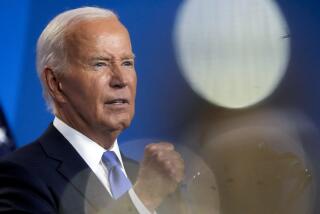Soviet Party Plans to Hold Congress on Schedule : Politics: A showdown between reformers and conservatives is expected at a Central Committee meeting Friday.
- Share via
MOSCOW — Despite a conservative surge that could undermine President Mikhail S. Gorbachev’s hopes of accelerating his reform program, the leadership of the Soviet Communist Party intends to proceed with its congress next week as scheduled, a ranking member of the party’s Politburo said Wednesday.
Vadim A. Medvedev, the party secretary for ideology, said that a final decision on whether to hold the congress in spite of calls for its postponement will be made at a meeting of the policy-making Central Committee that opens Friday.
In what is likely to be a major showdown between the party’s reformists and its strong conservative wing, the 249-member committee will also debate the report to the congress that Gorbachev will deliver as the party’s general secretary.
And it will review a rewritten party platform and a plan for the reorganization of party bodies, the two key documents that will be put before the 4,700 delegates to the congress as “blueprints for perestroika, “ as a Soviet commentator described them.
Medvedev said the platform, which was published Wednesday, had been reworked extensively to take account of criticism from both radical reformers and conservatives as well as to create a more philosophical, strategic document, which would lay the basis for broadening and speeding perestroika, as Gorbachev’s reforms are known.
Although there had been intense speculation that Gorbachev was seeking to delay the congress so that he could regroup his forces and ensure endorsement of his reforms, Medvedev said there was a strong consensus, now shared by Gorbachev’s supporters, that it is best to proceed Monday with what party officials regard as a crucial congress.
“I view with understanding the proposals to postpone the congress, but the train has already left the station,” Medvedev told a press conference. “Many leaders in the republics and regions (of the country) were in favor of sticking to the dates already established. This is the predominant opinion in the party. In my view, the congress will take place July 2.”
That the Soviet leadership was even seriously considering the possibility of postponing the congress, however, testified to the considerable disarray across the political spectrum, especially in the party hierarchy, as a result of the strong conservative push.
A good case had been made for the delay, Medvedev said, but the leadership decided in the end that the negative impact would be greater than any gain.
According to Medvedev, the suggestion of postponing the congress, months in preparation, arose because some provincial leaders were worried about gathering the earlier harvest and felt that too much time had already been taken up with political meetings.
But party sources, liberals and conservatives alike, said that close Gorbachev advisers had raised the possibility of a postponement after conservative delegates took over another party conference last week and turned it into a forum that virtually put Gorbachev and perestroika on trial.
Their quick calculations, these sources said, were that a repeat of such events at a full party congress--about half the delegates are regarded as conservative--would defeat Gorbachev’s plan for a broader mandate for political and economic reforms and a fresh team to implement them.
A postponement of the congress until fall, according to this thinking, would have deprived the conservatives of the momentum that they built up during the past three months. Last week, they elected one of Gorbachev’s sharpest critics as the new leader of the Russian party.
Boris N. Yeltsin, the populist president of Russia, the largest Soviet republic, was among those suggesting that the congress might be postponed until the autumn to “stabilize the political situation.” He predicted a “real struggle” in the Central Committee.
But Medvedev, who canvassed party leaders around the country, said that the “political arguments in favor of perestroika are also in favor of not postponing the congress.”
Were the leadership to put off the congress, which Gorbachev had twice brought forward from next spring, it would signal to the nation that the conservatives had wrested control of the party away from the reformers, according to most Soviet political observers.
“We expect healthy perestroika forces to take care of that,” Medvedev said when asked whether the congress would approve the platform and party reorganization.
The proposed platform, which will become the party’s basic policy statement, focuses on measures to pull the country out of its deepening political, economic and social crises.
It urges emergency measures to speed the transition to a market economy, to increase the supply of food and consumer goods and to build more houses but also balance the state budget and cut defense spending.
It also calls for steps to fight crime, improve health care and increase environmental protection. And, in response to spreading ethnic conflicts, it sets forth as a priority the drafting of a new treaty linking the country’s constituent republics.
Entitled “Toward a Humane, Democratic Socialism” and described by Medvedev as deliberately broad to avoid splitting the party along ideological lines, the policy statement breaks ideologically with the party’s historic position, noting its “heritage” from Karl Marx, Friedrich Engels and V. I. Lenin but declaring that good ideas must be taken from wherever they are found.
Many of the Soviet Union’s problems stem from its previous “distortion of socialism,” the platform argues in support of adherence to the “socialist choice.”
“False ideas about socialism as a society based on the state monopoly on property and dictatorship led by the party-state bosses in the name of the proletariat has brought tyranny and lawlessness and the alienation of people from property and authority,” it says.
In an effort to keep as many radical reformers within the party as possible despite their threats to quit and form a new party, the platform was rewritten to assure a place for multiple structures within the Communist Party and to relax the once rigid discipline of centralism that subordinated each party unit to another above it.
More to Read
Sign up for Essential California
The most important California stories and recommendations in your inbox every morning.
You may occasionally receive promotional content from the Los Angeles Times.













